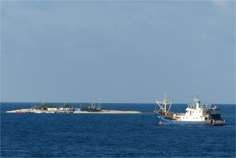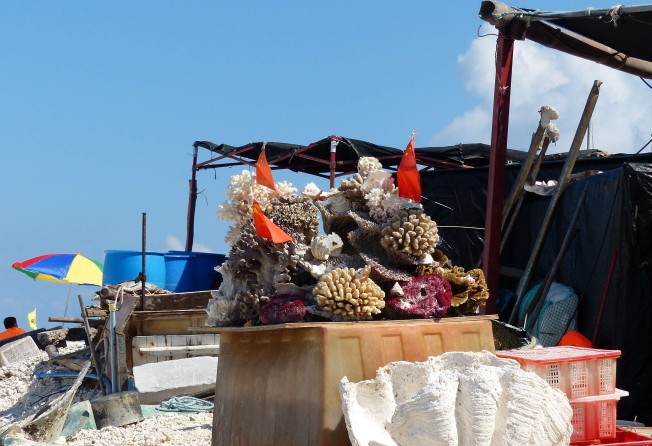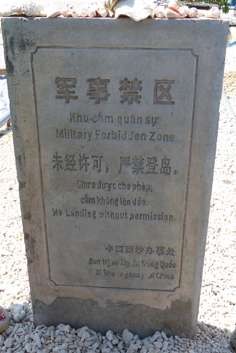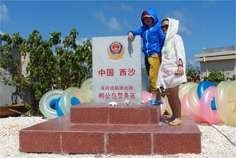
Yagong Island was no place for a dog, now it’s home to 400 trees
Villager estimates each tree on remote South China Sea island cost 20,000 yuan

The dog, perhaps the only one in the whole South China Sea, had no name.
His fisherman owner had brought him to Yagong Island, a one hectare pile of white coral and clamshells hundreds of kilometres from the Chinese coast with no fresh water, just a lagoon in the middle.
It was named Yagong (male duck) for its shape. But the island, in the Paracels, was home to no duck, tree, flower or even ant.

Most of the time his owner was away fishing, and the dog was left alone on the island.
The sky was blue and the sea was green. The dazzling sun grilled the coral. The dog jumped into the sea and swam and swam, but he did not know the way back home to the mainland.
He returned to the island, lonely and depressed. He refused to eat. He died.
He was buried beneath the corals and shells at the northern end of the island, so he could be closer to home. A stone bearing the inscription “Dog’s Tomb” marks the spot to this day, more than 20 years after his death.
Life was hard and lonely. Even the men didn’t want to stay for long
Humans have disputed possession of the islands and reefs in the South China Sea for decades, sometimes even going to battle for the fish in the water, the oil and gas beneath the seabed, the trade routes passing by and their national pride.
But living on the islands was a different story.
“We are here watching over this island for the country,” said Yagong village chief Ye Xingbin, a 66-year-old fisherman.
On nearby Silver Islet, an inscription in stone reads: “One has, takes and is dedicated to the responsibility to safeguard our lands.”

Ye, from Tanmen township, Hainan province, has called Yagong home for 16 years.
It used to be a temporary stopover used by fishermen. A stone erected soon after the 1974 battle with South Vietnam that secured the Paracels for China declares it a military forbidden zone in Chinese, Vietnamese and English.
Ye, who served as a porter in the 1974 battle, recalled the bad old days on the island when men collected rain for drinking, bathed and brushed their teeth with salt water, and washed their clothes in the sea.
As the name of the island suggests, there were no women on the island until last year.
“The living conditions were too bad for women,” Ye said. “Life was hard and lonely. Even the men didn’t want to stay for long.”
But China, eager to strengthen its control over the South China Sea, needs the Paracel Islands to be populated.

It established Sansha city on Woody Island in the Paracels in 2012 to bolster its claims to governance of a sparsely populated area of two million square kilometres – it has roughly 1,000 residents today – and followed that up with massive investment.
In 2013, Ye was provided with 120 tonnes of soil, 300 tonnes of fresh water and a supply of coconut fibres for his afforestation proposal – all shipped in. Official reports say it costs 100 yuan (HK$118) to transport each tonne of water from Hainan to the Paracels. He secured the soil with coconut fibres to retain water and successfully planted 400 trees on once barren Yagong.
A desalination device was installed the next year, which produces 15 tonnes of fresh water every day for drinking, washing and tree irrigation.
“Each tree has cost 20,000 yuan,” one of Yagong’s 78 villagers estimated.
More funding equipped the island with electricity generators, solar panels, public toilets and a satellite TV receiver. The government also bought each household a television.
“Otherwise the life would be too dull,” Ye said. “Now many of us even have an air conditioner at home.”

Ye’s tin-roofed house has no floor, like at the buildings on the island it’s fixed directly to the coral, but does have an air conditioner, refrigerator and television, plus a poster of President Xi Jinping and wife Peng Liyuan beside the door. If a big typhoon hits, the villagers seek shelter at the military bases on bigger islands nearby.
To make their homes safer, Yagong has plans for a 2,800 square metre residential and office complex, similar to one being built on nearby Silver Islet. It won’t be cheap because all the building materials will have to be transported from the mainland.
“Construction comes one island after another,” Ye said.
People are encouraged to live permanently on the islands, or at least change their residential registration to the villages. Yagong’s 78 registered residents are mostly fishermen, earning 60,000 to 70,000 a year. Since the launch of a regular tourist cruise line in 2013, they also get to sell seafood and local handcrafts to visitors and can also buy groceries from the cruise ship.
Yagong residents have set up a “tourism centre” with a seafood restaurant, and time fresh catches for the arrival of each cruise. The prices are not cheap, but villagers are proud of the freshness and taste.
“Meeting and talking with tourists is also fun,” Ye said. “Otherwise people just play mahjong in their spare time.”
The government pays each villager 45 yuan a day as long as they live on the island for more than six months a year. For officials like Ye, the term is seven months. Taking spouse along earns double pay, with the required stay extended to nine months.
But the transactions are sometimes delayed.
“I haven’t got my money for last year,” one villager complained.